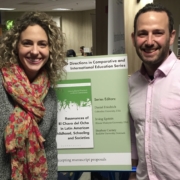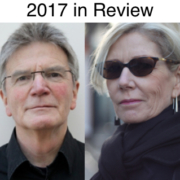Irving Epstein
Education, Affect, and Film
Today we put the field of comparative and international education in conversation with film studies. With me is Irving Epstein, emeritus professor at Illinois Wesleyan University.
Irving Epstein’s new book is Education, Affect, and Film: Visual Imaginings and Global Explorations Through a Comparative Lens. It will be published in June by Bloomsbury.
Citation: Epstein, Irv with Will Brehm, FreshEd, 352, podcast audio, April 29, 2024. https://freshedpodcast.com/epstein/
Will Brehm 0:16
Irv Epstein, welcome back to FreshEd.
Irv Epstein 0:56
Glad to be here, Will.
Will Brehm 0:57
So, congratulations on your new book. I really enjoyed reading it. It’s challenging because you’re taking two fields -comparative education and maybe something called film studies- and sort of putting them together and weaving in some of your ideas that you’ve previously written about on affect, which I’ve interviewed you about four years ago on that topic specifically. So, it’s really nice to see you sort of pushing some of these boundaries. And you write something at the end of your book; you say, quote, “CIE, comparative and international education, when done well embraces the search for new ideas to be found in environments distinct from those for which one is most comfortable”. Were you searching for new ideas by bringing together these two sorts of different fields together, and in particular, connecting it to your ongoing work on affect?
Irv Epstein 0:57
Well, yes. I wanted to extend the work on affect. I had previously done some work on film, and had written about street children in film, as well as a few films on Chinese education, cultural revolution, post-Cultural Revolution films. And thematically those were interesting, but it didn’t go deep enough. And what happened was that I discovered that Gilles Deleuze had written this two-volume study of cinema. And of course, he was a key affect theoretician whom I read previously. So, it seemed to me to make some sense to explore this area as a way of making I think, affect theory a little bit more accessible, as well as expanding our notion of comparison and of comparative education.
Will Brehm 2:29
It’s quite a feat, right? I mean, Deleuze is, of course, notoriously difficult to get your head into, and a two-volume book on cinema must have been just sort of eye opening. I mean, was it hard to get through that?
Irv Epstein 2:42
Yeah. What one does is one reads commentaries about the work and then one goes through and picks and chooses and with all of these theoreticians there’s the danger of being quite superficial and not really appreciating context. On the other hand, there is something which is enjoyable about applying something to a new situation, and thinking of it in new ways. So, I hope that I haven’t been too destructive of these ideas and superficially recounting them, but I do so hopefully, for a noble purpose.
Will Brehm 3:18
And what would you say that noble purpose is?
Irv Epstein 3:20
It is to first of all introduce a comparative education audience to some of these ideas. And second of all, to basically say, what we do as comparative educators has ramifications in all sorts of fields. And we’re not alone that the issues we struggle with because of our innate humanity, and humaneness -if that’s a word- that’s compelling. And it’s compelling to see that in many different ways.
Will Brehm 3:46
So, what would you say some of those big issues are that are both found in film studies and in comparative and international education?
Irv Epstein 3:55
There’s a basic question of representation, of what is real, what are we depicting? And there’s a question of audience, as to who we are writing for and how we treat our subjects. There are all sorts of questions about assumptions with regard to how we act, with regard to determinism, and agency. And then if you want to be a little bit more granular, there are similar patterns with regard to the way in which the fields have developed as disciplines and some theoretical issues. So, to give a couple of examples, theoretically, when you look at the history of comparative and international education, at one point, there is a focus on the Founding Fathers. And in film theory, “auteur theory” really looks at the unique styles of directors as individuals. At different points and different times, those fixations become a bit passe as people move on. In comparative and international education, certainly post World War Two, the emphasis upon structuralism through structural functionalism, human capital theory, modernization theory is quite pronounced as international development becomes quite essential to the field. And in film studies and in film theory -so, there’s structuralism with regard to the notion of language and text, and also structuralism with regard later to psychoanalysis, and Marxist views of the film as apparatus. So, you see connections there. And then you see connections in terms of the disciplines themselves. They’re applied disciplines, they’re popular, and yet the academy sort of grudgingly accepts them at different times. They’re both very much influenced by the Global North. English as the lingua franca, in terms of publication can be compared to the necessity of international films having English subtitles. And so, the power of the Global North audience is there. And then there’s a neoliberalism with regard to neoliberal values with regard to things such as competition for publication or competition for juried exhibition and dissemination. So, I find all of those things to be quite interesting. I mention in the book, it struck me as being quite interesting that Lewis Terman’s book on IQ, which promoted eugenics as a rationale for giving IQ tests, was written one year after Birth of a Nation, the notorious U.S. film depicting the work in positive terms of the Ku Klux Klan came out. In the same way in comparative education, in 1934, the main comparative education Journal, the International Education Review, was taken over by a Nazi scholar, one year later Triumph of the Will, is released. So, there’s a way in which ideas circulate in different fields. And part of what affect is, is looking at interconnection. And so, the power of ideas is what’s really, really useful and significant. And I think, hopefully, we take a look at that through looking at these two supposedly divergent fields with things that they have in common.
Will Brehm 7:10
I love it, because it’s like these two fields, which on the surface are so different, and yet, as you’ve just sort of shown so clearly is that they’ve sort of run in parallel and moved up and down with the times, reflecting different dominant ideas. And yet, perhaps, those in the field are just so blinkered to focus on our field alone. And it’s hard to make those connections elsewhere to then see if there’s any fruitful creation that can come out of bringing these two fields together. So, can you tell me a little bit more about how by bringing these together, affect and affect theory becomes sort of really important as a way of understanding the interconnections, and the way in which film and education sort of manipulate our senses and our sensibilities?
Irv Epstein 7:56
I guess what I would say is the principles of effect theory that I have emphasized include things such as interconnection, meaning making, assemblage and contingency. And I think you find that when you look at film, and when you look also at comparative education research, that those principles are quite useful and quite important, I’m not sure -in terms of the issues of manipulation- there’s discussion about that, right? So, there are many who argue, for instance, that it’s wrong to simply see film as a way in which your emotions are manipulated according to the director’s intent. Modern film theorists are saying, you know, “We sort of understand that what the camera is showing is a bit different from what we actually see. Whether it be the track shot, or the close up. If somebody’s running, we see them from the front, and then from the back. There’s an omniscience there that we know that the camera is acting in a certain way that’s not us”. At the same time, in comparative education, we know what propaganda is. We know when we suspend our critical thinking or are asked to do that. So, I think that affect theory is useful in the sense of asking us to see what kind of connections we make, how vibrant they are, when they dissolve and fall apart. And most importantly, that specifically with respect to film, there’s a tolerance of contingency and ambiguity that is not always there within the education realm. And I think that’s quite important. The reason why film can be more authentic, rather than the scholarly piece written in academic jargon, in part, is because there aren’t solutions. There’s no closure, and that’s life.
Will Brehm 9:48
I mean, I’m totally sold on this idea. I love it. As someone who watches a lot of films, I think it’s really great to see these connections with my own field and I’m just so happy that someone has actually taken the time and the energy to go and do this. As I was reading the book, I kept thinking about Slavoj Zizek, who also does a lot of work on film as a philosopher. There’s some YouTube video of him, where he’s green screened himself in front of different clips of movies, and he points out how ideology is sort of working within the scenes. And I sort of saw you in the same sort of vein where you’re sort of taking some of these cases, and you’re unpacking the movie, and bringing in different sort of film theory and CIE theory to highlight some of these different issues, and I just had such a good time sort of going through it. So, if you don’t mind, I’d love to maybe unpack two examples from the book just to give the audience a little taste of what you were trying to do and how you are bringing together these two very different fields. So, one of the movies that you really get into is a South Korean movie called Parasite, which has been, I think, it won an Academy Award, it’s won all sorts of awards. Can you tell me a little bit about Parasite, and how you read it in relation to comparative education and film theory?
Irv Epstein 11:04
So, Parasite, was the first international film to win Best Picture of the Year. So, in the United States, that was something which is quite remarkable. What I loved about the film, is that its authenticity is in that it appeals to all of our senses. And to me, it is a radical critique of class and class injustice. But it appeals to our sense of humor and absurdity, as well as the violence of class injustice, which isn’t really present when we think of class conflict, specifically in the United States, and in academic literature, because we think of meritocracy, generally we buy into it, or we see, well, there are winners or losers, and we see the end result, but we don’t see how it affects who we are. We don’t see it in identity terms. And in this case, the beauty of the film is that the director appeals to all of our senses to see the ways in which class injustice occurred. So, a marker for class injustice in this film is smell; a marker is also space. So, vertical space, represents affluence. The poor are subterranean, they’re living in basements, they’re stuck, they’re not going to move up. And that sense of verticality, that is intentional, you know.? So, when we think of meritocracy, we sort of buy into it, but we don’t really see the injustice of it. Now, when we think of comparative international education, at least in the Global North versions of, oh, Korean education, or South Korean education, we might talk about “shadow education”, whether it works or whether it doesn’t work. We might take a look at the PISA studies and look how well the Korean students are doing on international assessments. But it does not get to how people see themselves and how education is implicated as being hypocritical and as being injurious. So, that’s why I think this is a really great film. Now, what I want to say, also, you know, in the book, I use three films per theme. So, the other two films looking at social class, one is called Separation, which looks at the Iranian case with regard to these issues of modernity and religion, and class. The view that neither solution is ethical, and all of the characters are ethically compromised, and that there seems to be no way out there. And then the third film that I look at with regard to social class is Still Life, which is a great Chinese film by Jia Zhangke and in that film, the issues of globalization and alienation resulting from the destruction of this 1,000-year-old city due to the Three Gorges Dam project. You know, what that shows is that there isn’t class resistance and education plays a very minor role in these people trying to confront a changing reality, which is destroyed family life and community. So, all together these films, although they don’t explicitly talk about institutional education, they critique education in terms of its role in confronting class conflict.
Will Brehm 14:35
And I guess one of the things that comes up is this question of when you read the films and analyze them in this way and try and get an understanding of the machinations of social class and how it works and how it smells and how it looks and how it feels -you know, class is something that comparative ed scholars have written about for a long time as well. So, is there sort of a difference in what you can do with film when it comes to understanding and representing an authentic understanding of class compared to sort of the written form when scholars have tried to identify and understand and represent what social class is or is not?
Irv Epstein 15:12
I think there’s a conceptual difference, right? The conceptual difference within the social science literature and the comparative ed literature is much more narrow and limited. So, it’s often focused upon institutional mechanisms that reproduce class position, or else it’s looking at the role of the school as an agent of the state in producing the knowledge economy or in socializing students in certain ways to adhere to certain values or principles. And yet a larger notion of class; class in terms of identity, in terms of personhood, in terms of your day-to-day existence, is something that is often lost. And that’s what I think these films help us to appreciate in ways that the formal academic literature doesn’t. The other thing I want to say, Will, is that part of the issue is that we are all beneficiaries of the education system. We’re the winners. So, it’s harder for us, even if we critique the system to come to terms with the possibility that it may be less consequential than we would like us to believe. And I think filmmakers can put us in our place that way.
Will Brehm 16:20
And I think that actually it’s humbling and just very healthy, I think, to recognize one’s own limitations and limits. Another big topic or theme that you address in the book is race and colonialism, which of course, in the field of comparative education has really like many other academic fields, I would imagine has really come about in the last few years, or maybe even last decade at this point. And one of the series of movies was something called Small Acts by the artist, Steve McQueen. I absolutely loved watching all of these short films. I think Steve McQueen is just an absolutely amazing director and this sort of series of films is about Afro Caribbean communities in the UK and sort of issues of identity issues of racism really come out. And he does it in these absolutely beautiful films. So, how do you read Small Acts when it comes to film theory and comparative education? Like how do you understand race and colonialism by watching Steve McQueen’s, Small Acts films?
Irv Epstein 17:23
So, what I do is I present basically, three themes with regard to the academic literature on race. Within the United States, Afro-pessimism is quite prominent. And it’s the feeling that it’s not enough to think of race in terms of racial capitalism, or simply as an affectation of global capitalism, or empire building, it’s something more fundamental. And then there’s also work on whiteness, right? It says, the default, and it being predominant throughout culturally. And then with Small Acts, I think that represents the third kind of view. And it’s interesting that the writer who has really pioneered work in terms of the Black diaspora, Paul Gilroy, was a consultant on these films. And so, the notion of Black diaspora, it’s a sense of possibility of the fact that your indigeneity is not limited to physical space. And the idea is that, yes, as Afro Caribbeans, we are part of the empire. The British Empire is not whiteness, per se. And we can negotiate a way of really creating something important and relevant and the struggles of this community to manage and balance their own sense of identity, which, on the one hand, when they are not allowed to affirm it publicly in public spaces, is something which occurs throughout, but it’s quite positive, with the exception of Lovers Rock -which was your favorite, and my favorite, too, because of its ambiguity. But in all of these films, they’re heroes at the end, they persevere. So, they’re able to manipulate the systems. And it’s the education system and education, the final film, as well as the legal system, the police system. And so, there’s a heroism which is there. But that’s totally antithetical to the comparative work, The Underground Railroad series, which I look at which affirms Afro-pessimism as racism being enduring a permanent stay of American character. As well as the South African film Tsotsi, which really unintentionally affirms whiteness and white purity and sees Blackness really as threatening. So, that’s how I would see that how that works out.
Will Brehm 19:50
In terms of Lovers Rock, I think one of the reasons I love that is there’s that long scene of the dance party where the music is going, and it seems to be like one continuous shot, and it moves around, and you just see this whole world. It was exciting, right? And it felt like I was there. And when I watched that it had such an effect on me. And it created an emotion where I felt like I was part of that dance party. And it is truly something that I don’t -like only film can do that right? Film can bring you into this world and just -it was amazing. I don’t know how Steve McQueen did that shot but it was just -because it was quite a long shot, if I recall. And it was just this amazing, amazing scene that I absolutely loved about Lovers Rock.
Irv Epstein 20:38
But for me, it’s juxtaposed with the question of masculinity. And then at the very end, the tragic nature of the main character just being dehumanized. And that’s the reality. So, it’s this temporary escape, which doesn’t last. But what he does and what you’re mentioning, -it’s not just the visual in film, it’s really looking at all of the senses. Food is very important, a cultural artifact in these films, as well as space, movement, touch. So, it’s not simply the visual.
Will Brehm 21:10
And in their collection, it’s engrossing. And as I think you rightly bring up is that it does juxtapose these certain sorts of exciting feelings with absolute feelings of horror and dread. And he does it so well, because he sort of moves through them almost seamlessly, and you’re on this roller coaster of emotions, watching that particular short film. You know Irv, when I read your book, at some point, maybe it’s in the acknowledgments, you sort of talked about how this is a book that you started really working on during COVID. And it was like the perfect COVID project in a way, right? Because you can just watch films and you can be in your head, you don’t have to go out into the world of field work. And when I was reading about Steve McQueen’s, Small Acts, it made me think about his newer film called Occupied City, which was his sort of COVID project, right? Where he went around Amsterdam, filming all these different sites, and then juxtaposing the sites that he filmed with sort of archival material about who lived in those places during the Nazi occupation. What did you think of that film? I know, it’s not in your book, but it’s the same director, and it happened at the same time that you put this book together.
Irv Epstein 22:24
So, I think it was his wife, right, who is from Amsterdam, who did the book documenting and mapping Holocaust atrocities, repeatedly, in Amsterdam. And in fact, the context is that very little in this society has been done to reconcile the collaboration and actually what happened. What I found fascinating about the film was that the text becomes more important than the imagery. That the imagery we see in terms of the day-to-day functioning, right, the lack of historical memory, and the lack of coming to terms with what’s happened. And in repeating that, then your focus is on the text rather than the image. And I think that’s an interesting inversion of what one normally expects. So, it was very difficult to watch it, 4 hours. So, I had watched it in two different time periods, but I thought it was -and a lot of it is quite repetitive, right? And it starts out looking at a particular space, explaining what’s happened, and then the comment is destroyed, and we see that throughout. And so, I found it to be quite interesting, and quite an interesting inversion of what one would normally expect.
Will Brehm 23:47
I totally agree. I couldn’t watch it all in one go either. It was relentless. It was monotonous, it was repetitive, and it lulled you in. And I think you’re right, the text became much more important. There were certain moments that I thought worked really well. The text and what was being seen, and it was just sort of disturbing to watch, really jarring. And then other parts of it were sort of, I guess, ambiguous and it sat with me. I was a bit more unsettled in the sense of I wasn’t sure if he was sort of saying the COVID lockdowns are akin to the Nazi occupation, because at some points, it sort of went down that road and I’m like, wait a second, and it sort of really threw me off as well.
Irv Epstein 24:28
I think there were some people who were protesting and we’re doing it but at the end, when you saw all the freedom that they had, and what was happening, then you saw that that was quite ridiculous. To me, what was most jarring were the scenes in apartments where people eating, cleaning, living, in these horrific spaces where such violence occurred, and it brought me back. I’ve been to Dachau, and I’ve been to Ravensbruck concentration camps, and it’s impossible to fully understand the horror of what’s happened there. When I was in Ravensbruck, a few years ago, they had kids coming, and they were playing soccer on the site. And that’s a similar feeling of, “Yes, life goes on. But how do you honor the memory of those who suffered and who died? And what is memory, other than an extension of the present”? So, I mean, those are interesting questions, which I think he raises.
Will Brehm 25:23
I love it, and just how geography is so important to how memory works, or doesn’t work. Yeah, it was a fascinating film. I’ve heard very mixed reviews about it. But I would recommend it because it was definitely an experience. I want to return back to the main topic here. And just sort of ask you; now that you’ve looked at all these films, you’ve sort of really done a deep dive into film theory connecting it to comparative education, what’s your overall read on what films can tell us about sort of education more broadly?
Irv Epstein 25:55
I might be repeating myself a bit, but what I think that films tell us -they reiterate the point that education involves interconnection, and that is essentially what we, in fact, are about. And we don’t have the answers as to why we connect and interconnect. And at the same time, films tell us I think that life is not predictable, and life is quite uncertain. There is a recent book by a political scientists Brian Klass called Fluke and he talks about the importance of random events in life. So, to give you an example, he mentions the fact that Henry Stimson, the Secretary of War, 25 years before the dropping of the bomb, visited Kyoto and fell in love with Kyoto with his wife. That’s why Kyoto was not bombed, and Hiroshima was. So, who can predict that? As a result, he says, what that means is that every moment is precious, that every event has meaning. And I think that’s something that we can take out through these films, right? That we can appreciate life without resolving the questions that these films raise. And in terms of educational issues in comparative education, there can be a little less hubris as to what we do, a little bit more modesty. And it’s important to look for patterns and to look for things that are similarities, and we need structure in our lives, but we don’t need to overdo it, right? And I think that the more we think of comparative education, particularly as one of many different fields, open to ideas from different areas -and in Klass’ case, its chaos theory, which moves him- the more we can expand the field. And I think that’s something that’s worth pursuing.
Will Brehm 27:42
Well, Irv Epstein, thank you so much for joining FreshEd again. It’s absolutely always a pleasure to talk with you and I look forward to your next book.
Irv Epstein 27:49
Thank you, Will.
Want to help translate this show? Please contact info@freshedpodcast.com
Related Guest Publications/Projects
Education, affect, and film: Visual imaginings and global explorations through a comparative lens
Assemblage, affect, and Covid-19: Implications for comparative and international education
Affect theory and comparative education discourse
Mentioned
Deleuze and the concepts of cinema
Lewis Terman – Mental growth and the IQ
Reflections of media and the politic and cinema – Slavioj Zizek
The Underground Railroad mini series
Amsterdam 1940-1945 – Bianca Stigter
Ravensbruck concentration camp
Recommended
Afropessimism: a genealogy of discourse
Reimagining the aims and boundaries of education through film
The use of motion pictures in comparative education
Postmodernism and its comparative education implications
(Re)Imagining education through film
Have any useful resources related to this show? Please send them to info@freshedpodcast.com









